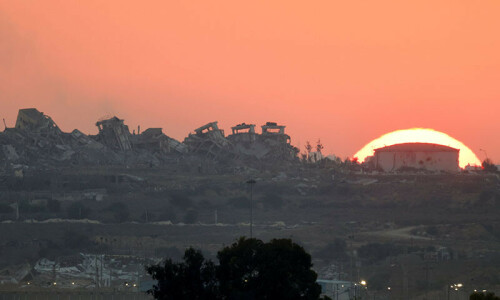
KABUL: Ten years after the fall of the Taliban, who banned modern technology as un-Islamic, the use of social media in Afghanistan is booming as politicians, warlords and even militants rush to get their message across.
The Taliban, who ruled Afghanistan from 1996 to 2001 and forbade the use of the Internet, deeming it a Western propaganda tool, now regularly use Twitter to promote their ideas and boast about attacks on Nato forces.
The militants are reluctant to discuss the thinking behind their Internet U-turn, but last year's Arab Spring was a wake-up call to the Muslim world about the ability of social media to organise mass movements and communicate a message outside traditional channels.
Taliban spokesman Zabihullah Mujahid said they would still ban the Internet or any other media outlet if they were used for “un-Islamic” purposes, but for now they are happy to use it as a public relations tool.
They have set up an official website featuring propaganda videos depicting their campaigns against US-led Nato forces in Afghanistan, including scenes of attacks and bombings.
“The leadership of the Islamic Emirate of Afghanistan regards social media, in particular Facebook, as a useful way to communicate and pass messages of the Islamic Emirate to Afghans as well as foreigners,” Mujahid told AFP.
“In fact the commission for cultural affairs of the Islamic Emirate encourages our people inside and outside Afghanistan to use social media to pass our messages to the Afghan nation as well as to the Westerners.
“We know that Twitter is very popular among Westerners and we are using it to pass our message and philosophy to a different audience, including Westerners,” he said.
Some two million people, less than 10 percent of the population, have computer access to the Internet, officials say, but the figure is rising and many more have access through the increasing use of smart phones.
Status update: Former warlord
The role of social media in the Arab Spring convinced one seasoned Afghan figure, Abdul Rashid Dostum — a former warlord who now has an official Facebook and Twitter account — said his aide, Homayoon Haqbeen.
Dostum, who is considered by many as the leader of Afghanistan's Uzbek minority based largely in the north, is also part of the National Front, a major political alliance planning a push for the presidency in 2014 elections.
The incumbent, President Hamid Karzai, is constitutionally not allowed to seek another term, but is expected to present and back a successor.
Homayoon said Dostum wants to get his message out to young, energetic and educated Afghan youths as well as to a Western audience.
“Nowadays you see that almost all the active politicians and many Afghans interested in politics are on Facebook or Twitter,” he said.
Like the Taliban, Dostum knows that he can use the traditional channels of local elders and mullahs to address and mobilise poor and illiterate Afghans who make up most of the population in rural areas.
“We launch gatherings and rallies in some provinces, mainly rural areas to communicate and address those people who have no access to the Internet.
“But we see social media as an effective way to communicate our messages with the educated Afghans inside and outside the country, as well as with the European and Americans who are engaged or interested in Afghanistan's affairs.”
With a presidential election due in 2014 — the same year that Nato's 130,000 troops are due to withdraw — a number of young Afghan MPs have already set up Facebook pages.
“As a member of Parliament I find Facebook a wonderful tool to communicate with people, I really like it, this is a great tool for politicians to promote their work and personality,” said Afghan MP Houmaira Ayoubi.
“I am excited to see thousands of young and educated Afghan men and women inside and outside Afghanistan are using Facebook and Twitter to discuss the political situation in the country.”
Bringing about social change
Ayoubi says watching the Arab Spring unfolding in the region gave her the idea to use social media to organise people in her constituency.
Afghans are also using Twitter and Facebook to bring about social change, particularly women, who are largely marginalised in what is a deeply conservative, male-dominated society.
A group called “Young Women For Change” recently opened Afghanistan's first women-only net cafe in Kabul, named after Sahar Gul, a 15-year-old child bride who was tortured and jailed by her husband.
While there are many Internet cafes in the Afghan capital, the group says women do not use them because they face male harassment.
“In addition to providing Internet access to women, we regularly hold training sessions for girls to teach them the importance of social media and how to use it in order to raise awareness about their rights,” said Sahar Gul's Netcafe manager Tooba Ahmadyar.
She says though the move is largely symbolic, the opening of café may boost the morale of Afghan women.
"If the Arabs managed to use Internet to mobilize against dictators, we can use it to form a strong front of educated Afghan men and women to stand against the oppression and defend our rights", she said.













































